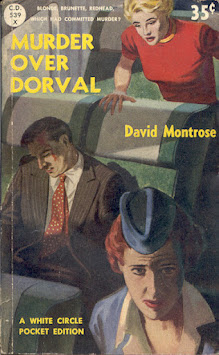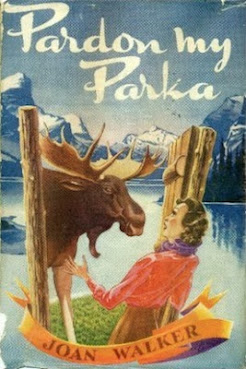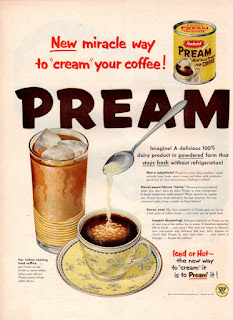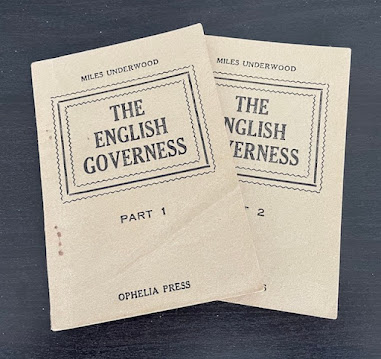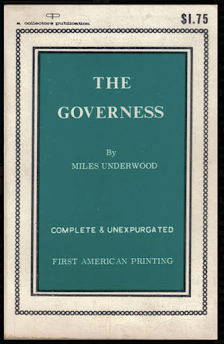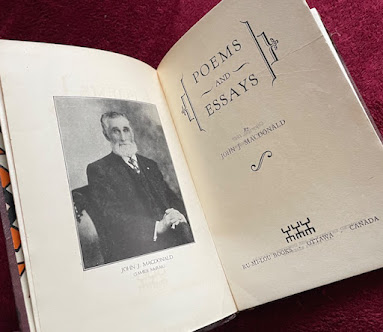Arthur Mayse's Perilous Passage is now arriving in better bookstores. Its publication comes after a long search. Post-war Canadian noir is expansive, but not in terms of geography. Most novels are set in Montreal; add in Toronto and you've pretty much covered the waterfront.
11 February 2022
West Coast Canadian Noir
Arthur Mayse's Perilous Passage is now arriving in better bookstores. Its publication comes after a long search. Post-war Canadian noir is expansive, but not in terms of geography. Most novels are set in Montreal; add in Toronto and you've pretty much covered the waterfront.
07 February 2022
The Incomplete Repent at Leisure
A follow-up to last month's post on Joan Walker's Repent at Leisure.
Joan Walker
The Star Weekly, 5 October 1957
The Star Weekly would like the reader to know that Joan Walker's Repent at Leisure is an award-winning novel.
 |
| 27 June 1944 |
While I'm sure it's possible to publish a 94,000-word novel in fourteen tabloid-sized pages, I very much doubt it could be read with the naked eye.
How was it done? Cut the first two chapters to start.
This Repent at Leisure begins shortly after Veronica's arrival in Canada. There's nothing of her relationship with her parents, their concerns over her hasty marriage, or the descriptions of post-war air travel that this reader found so interesting. It opens instead with our heroine sitting, waiting her turn to meet with a customs officer.
Other cuts aren't as glaring, but they are obvious. I had some fun in comparing the two versions. This is the Ryerson version with the words cut in the Star Weekly struck out:
I like this scene because the Westmount Nash family come off as snobs of the highest order, which I'm certain wasn't the author's intent. They also seem so very English -– more so than the immigrant who has just arrived from London. Gone is the awkward and unnatural dialogue about the "Indian village Cartier found in fifteen-something on his first trip up the St. Lawrence;" which shouldn't have made it past Ryeson's editor.
The most interesting thing in comparing the two came in the discovery of additions made to the condensed version. Alan smokes whilst poring over the map in the Star Weekly edition. Margaret suggests that he's found only one Giroux Street because his map isn't up-to-date. Jane hands Veronica a cup of tea and a pink linen napkin.
All minor changes, but mysterious given that the task at hand. And who did that task? Was it the author herself? The copyright notice suggests as much.
Might it be that the added bits are things the editor at Ryerson cut?
All this begs the question: Whatever happened to Joan Walker's papers?
01 February 2022
'February' by Marjorie Pickthall
25 January 2022
On the High Heels of Pleasure
Joan Walker
Toronto: Ryerson, 1957
284 pages
Thus grief still treads upon the heels of pleasure:Married in haste, we may repent at leisure.— William Congreve, The Old Batchelour (1693)
She wore a wheat-coloured Irish linen suit, with an ascot of tan silk stabbed by a delicate diamond brooch. A very new, rather small mink cape was slung over her arm. Beside her brown crocodile pumps there was matched rawhide luggage tagged with BOAC labels, "Montreal".
 |
| Grosvenor House, c. 1940 |
Jane Nash was quite lovely. Brown shining hair and laughing hazel eyes like her brother's, only his weren't laughing now but strangely thoughtful. She like the way Jane looked as crisp as a lettuce in a green and white print with china bracelets heavy on one wrist and tricky white suède sandals strapped over incredibly fine nylons.
He swayed to where Veronica was sitting on on the edge of the bed, her eyes bright with tears of helpless laughter, He slapped her face. He said something in French which was neither civilised nor cultured.Veronica's face went very white, except for the red marks of his hand. She stared at him silently, incredulously.As a surgeon's daughter she knew had been on the verge of hysteria [sic]. She knew, too, that Louis had done the best thing possible by slapping her. But she also knew, with a cold certainty, that the reason for his blow had other causes and that he had no idea whatsoever of its therapeutic worth.It was like waking up and seeing a stranger. She had loved Louis deeply in England, but now he was unknown. An interloper in a loud, impossible blue suit, a belligerent, drunken, unattractive creature. She didn't love him at all.
17 January 2022
The Dustiest Bookcase: U is for Underwood
Miles Underwood [John Glassco]
Paris: Ophelia Press, 1960 [sic]
290 pages (in two volumes)
03 January 2022
Spoiled by a Publisher
Grant Allen
London: Chatto & Windus, 1901
317 pages
Roughly one-third of the way though Philistia, Herbert Le Breton prepares to ascend the Piz Margatsch
I was hoping he'd be killed in the attempt.
The death would be hard on his mother, of course, but then Lady Le Breton is accustomed to loss. Some years before, her husband, Sir Owen, perished in the Indian Mutiny, leaving her with three young boys and an unexceptional military pension. The widow soldiered on, raising her sons in a modest townhouse in an exclusive neighbourhood. Its address had everything to do with keeping up appearances.
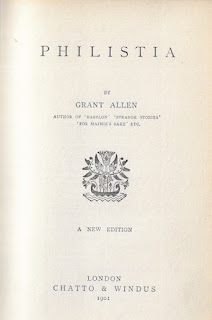
Oxford men, together Herbert and Ernest form one half of a clique that includes mathematician Henry Oswald, a Fellow and Lecturer at Oriel College. The last in their group, the Reverend Arthur Berkley, curate of St Fredegond's, has first-floor rooms in the front quad of Magdalen.
All four men are close, but not nearly so that they know much about one another. No one is aware that Arthur is the son a poor shoemaker. Lady Le Breton's sons have some idea that Henry Oswald's parents are grocers in "the decayed and disfranchised borough of Calcombe
Pomeroy."
It goes without saying that class distinction and geography mean nothing to Ernest, whose heart is won by Edith Oswald, Henry's lone sibling.
Can you blame him? Edie is as intelligent and personable as she is pretty. And, though low on the social scale she's dedicated to the betterment of the less fortunate.
Ernest and Edith are a great match, but Herbert looks down on the couple. That he does has everything to do with my wish for his death on Piz Margatsch. You see, Henry too shares a relationship with a grocers' daughter: Selah Briggs. She knows him as "Herbert Walters." He's promised marriage, but has no intention of watching her walk down the aisle. In short, he's stringing her along.
Grant Allen's first novel, Philistia followed seven volumes of non-fiction, the earliest being Physiological Æsthetics (London: Henry S. King, 1877). In My First Book (London: Chatto & Windus, 1897), Allen writes:
I wasn't born a novelist, I was only made one. Philosophy and science were the first loves of my youth. I dropped into romance as many men drop into drink, or opium-eating, or other bad practices, not of native perversity, but by pure force of circumstances. And this is how fate (or an enterprising publisher) turned me from an innocent and impecunious naturalist into a devotee of the muse of shilling shockers.The author is being far too hard on himself. Philistia is no shilling shocker; it contains neither crime nor violence. One life is lost, but this is the result of an unfortunate accident. It's clear that Allen had no interest in writing an entertainment, rather he saw Philistia as an opportunity to employ fiction as a means of sharing his thoughts on science, evolution, religion, politics, and the distribution of wealth. If this sounds in any way dry, I assure you that it is not. Allen comes up with a clever story about hypocrisy, injustice, and privilege in Victorian society. Its characters are very much alive.
I really did want Herbert Le Breton to die.
As a first time novelist, Allen's greatest fault lies in his reliance on introspection... needless introspection... pages of needless introspection.
Pages.
Dear Mr. Chatto,Many thanks for your letter of hints about my unfinished novel. "Philistia" is certainly a very taking title, and I shall be very glad to adopt it. If you want to announce the novel in your programme for the "Gentleman's" (as I suppose you will), I think it had better be under that name.
As to not killing Ernest le Breton, I hardly see how one is to get out of it. To me, it seems almost the only possible end. If you feel very strongly that readers won't allow him to be killed, I will try to find some other alternative, but it will be difficult to manage. If one made him recover or get on well in the world, then there would be no dénouement, and, as a matter of character, I doubt whether such a person ever "would" get on well. However, I shall be guided by you in the matter; and if you think it indispensable that Ernest should live, I will try to work out another conclusion. I intended from the first that Ronald should marry Selah; and if Ernest doesn't die, there is no reason why Lady Hilda shouldn't marry Berkely.
Yours very faithfully,
Grant Allen.
As a result, I came away from Philistia feeling so very, very sad.
Bending over towards where Hilda sat, he took her hand in his dreamily: and Hilda let him take it without a movement. Then he looked deeply into her eyes, and felt a curious speechlessness coming over him, deep down in the ball of his throat.
I think we can all agree that it is the better title.
Object: "A NEW EDITION" published two years after the author's death, my copy was once part of Boots Booklovers Library. I'm not sure how to read this label, pasted to the rear endpaper.
Someone may be able to enlighten.
I purchased the book in 2018 from a British Columbia bookseller. Price: US$35.00.
Access: Philistia first appeared in 1884 numbers of The Gentleman's Magazine under the pseudonym "Cecil Power." Later that same year, it was published by Chatto & Windus in a three-volume edition.
The 1888 Chatto & Windus "cheap edition" can be read online here thanks to the Internet Archive and Emory University. The cover illustration is interesting in that it depicts a scene featuring Rupert and Selah, two minor characters:
As I write this, no copies of Philistia, in any edition, are being offered online.
Remarkably, Allen's 1883 letter to Andrew Chatto may be purchased as part of a small collection that also includes a copy of The Woman Who Did inscribed by the author to Andrew Lang.
My birthday is in August.
01 January 2022
Unpleasant Verse for New Year's Day
THE SCATTERED FAMILY ON NEW YEAR'S DAY
Though mountains and forests and waters divide us,Where fate and ill-fortune have led us to stray;Though infidel strangers are living beside us,Our hearts will together be dwelling to-day.Aglow with affection, with vivid love burning,In fancy, dear parents, to you we will flee;From North, from the West, from above, where no mourningEmbitters the joys of the blest and free.We hasten, dear parents, our homage to render,Our hearts as our treasure lay at your feet,And proofs to convince of our reverence tender,To beg for your blessings at home's sweet retreat;To think of the scenes of our innocent childhood,Where, happy, contented, not dreamed to care,We roamed through the valleys, the meadows and wildwood,To view the fair blossoms then flourished there.'Tis true that our hearts often linger around you,From morn until evening when bound by sleep' schain,Then dream of the cords of love to us that bound you,And sigh to return when it frees them again.To-day shall they linger more constant than ever,Around our loved parents, around our loved home;No thoughts of the world for a moment shall severOur hearts from that spot, or from there make them roam.What prospect to children, to parents more pleasing,Than that we this union might share!In filial love be united unceasing,No matter what fate or our foes may prepare.'Tis true not on earth, for we'll soon be dismembered:Shall death in the good love of others destroyCan bliss then be reining and home unremembered?Away with such motions of heavenly joy.
















